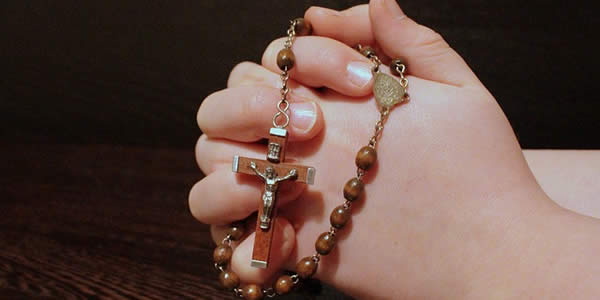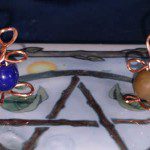
This Sunday, March 20, 2016 at 8 PM EST on Fox The Passion, A Musical, will portray the story of Jesus Christ from his last supper, to betrayal by Judas, to trial, conviction and crucifixion. I think as a Pagan parent you should watch it.
Here is the thing: your child is being raised in a society dominated by Christianity. You have an opportunity to watch an entertaining show and discuss the religious meaning behind that show so that your child receives an inoculation against rigid Christian indoctrination in the future.
An inoculation against rigid Christian indoctrination is the best way to ensure that you have raised a child who is tolerant and open minded. Through deliberate exposure to Christian ideals you can introduce inoculating truths. As Pagans, we often complain about the lack of understanding by others about our religion. How much effort, however, do we put into understanding other religions?
Below, I am going to explain the story of The Passion and Jesus Christ and some inoculating ideas you can introduce. This piece ends with questions you can ask to start conversation with your children. Please don’t let age limit your discussion with your children. Be willing to ask these questions to any age and see what answers come back, you might be surprised.
Inoculating Idea: The Jesus Story is a Myth
What Christians tell the under-educated is that the Jesus Christ story is real and true and accurate and actually happened. Most adults who have only been exposed to Christianity have never encountered the idea that the Christ myth is a myth, a myth that we can find in many different religions and cultures throughout history. Although the Christ Myth in Christianity has enjoyed a popularity not experienced by other Christ myths, it is still one of the many myths of a dying God or King who is resurrected on the third day and whose death is seen as a sacrifice so that others do not have to sacrifice.
The Jesus Christ Story Portrayed in the Passion Follows a Specific Plot with Alleged Spiritual Implications
Christians believe that all of us are born into sin. Sin is a condition of having been born. Paganism sees human nature as neutral at birth – we are neither bad nor good as a baby, we are a baby. As we grow, we determine what our values, ethics, and morals will be. We are limited only by the confines of the natural order into which we have been born. This is an inoculating idea: that sin is not a condition we are born into.
Because Christians believe we are born into sin, they believe there must be a sacrifice–a blood sacrifice–to overcome the taint of sinning. In the Old Testament of the Bible, these sacrifices were cattle, birds, and other animals ritually slaughtered as a blood offering to God, The Father. In the Old Testament a prophecy predicted the birth of a man whose father was God, whose mother was a virgin, and who would die and be the final blood sacrifice so that the slaughtering of animals was no longer needed.

This sets up the plot and spiritual path of Christianity.
- Jesus is born of a Virgin Mary
- Jesus lives his entire life (33 years) without ever sinning. He never lied to his mother. He never swore. He never broke any of the ten commandments of the Old Testament.
- Jesus performs miracles and galvanizes both Jews and Gentiles (i.e. people who were not Jewish).
- This angers the state, depicted by Pontius Pilate, who sees Jesus as a threat to the authority of the state and also sees Jesus destabilizing the status quo of the Jewish Community.
- Judas, a disciple of Jesus, betrays him to Pontius Pilate and Jesus knew he would and wanted him to. Jesus knew he was the final blood sacrifice that fulfilled the prophecy of the Old Testament.
- Jesus stands trial and remains without sin (or blameless).
- Jesus is beaten and crucified.
- Jesus raises on the third day from the sealed tomb.
- Jesus ascends into heaven.
- Because of his sacrifice, Christians believe that only the belief in Jesus is necessary to obtain heaven and avoid hell.
Problems with Christian Doctrine: More Inoculating Ideas
Interpretation is a problem with Christianity. Is hell simply a separation from God or a fiery pit of endless torture and pain? Depends on which Christian sect you talk with. If Jesus is the final sacrifice, then are the laws of the Old Testament supposed to be followed anymore? Depends on the Christian denomination you follow. Was Jesus Christ an actual person or a myth? Depends on the type of Christianity you follow.
This all comes down to interpretation. Each denomination and sect of Christianity will interpret the specific meanings of the events in The Passion a little differently, to say nothing of the differences between Protestant doctrine and Catholic doctrine.
Free will versus predestination is another important issue in Christianity. The majority of protestant churches will say that humankind has the ability to accept or reject Jesus Christ. It is this acceptance or rejection that determines their afterlife: heaven or hell. Further, they believe that once Jesus Christ has been accepted by a person it will change them radically. This is called the conversion experience through salvation. Salvation means that Jesus Christ died for everyone’s sins so that individuals would not have to. By accepting Jesus Christ and believing only in his myth, you are converted to Christianity. On the other hand, there are some protestant sects who believe that God’s Chosen People were predestined upon birth. Often these groups see baptism as the ticket to secure this predestination.

The divine nature of God is another issue Christianity must face. If God (which in the New Testament is seen as a three-part being called God the Father, Jesus Christ, and the Holy Spirit), is all powerful, all knowing and is a part of everything, then where does evil come from? For Evangelicals, evil is manifested in the story of Lucifer or Satan. They visualize an angel that has chosen to fall from grace and rebel against God’s divinely good nature. All sin and evil are rooted in Satan. Interestingly, some also say that God is not divinely good. Just like in the Old Testament, God is judgmental and will cause horrible things to happen to those who do not live within the will of God. They believe not only will bad things be forced upon wicked people after death, but they believe that bad things will happen to wicked people in life.
Conversely, good people will prosper. This is part of a very popular movement called Prosperity Teaching or Prosperity Gospel. It teaches that if you are a good Christian then God will give you money in relationship to how much money you give. As the song taught to children goes, “Read your Bible, Pray Every Day, And You’ll Grow Grow Grow [your bank account].”
What Paganism Says about Christianity
Generally speaking, Paganism answers Christianity with alternate opinions on everything. Jesus Christ can be an actual god to some Pagans, in the same way that Buddha and Odin are gods. To other Pagans, Jesus Christ is a mythical representation of the sacrificial god like the Oak and Holly King Myth. Because Paganism isn’t hung up on The Bible being the ONLY sacred text, many Pagans will agree with things in the Bible that mirror other sacred texts like “love thy neighbor” which is an almost universal teaching throughout all religious paths.
Pagans will argue about free will and predestination, too. Some will say that you are born predestined to be a witch and some will say you make that choice. However, most Pagans will not see this argument as very important in the grand scheme of things.
Evil, though, is viewed very differently. As I have already said, Pagans see babies as babies – neither good nor evil, just born. Like the wild wood that is dangerous but not evil or the raging storm that is deadly but not evil, Pagans have learned that good and bad simply exist as two sides of the coin of life. There is no judgement attached to the existence of either. Sometimes thing burn, wind blows, water flows, the earth moves. These things just happened and do not have to be because some divine being got angry or because a person wasn’t “good” enough.
Paganism is highly attached to the idea of personal responsibility and consequences. Sometimes bad things happen because a person has created a situation for the bad thing. For example, someone who robs stores on a regular basis eventually gets shot by a store owner. The consequence of stealing was death and in Paganism this is seen as one of the potential outcomes of that behavior. However, even the most personally responsible human being in the world may still have unfortunate things happen to them because that is a law of nature and not a judgement on the nature of that human.
Pagans interrupt prayer as a type of energy work in the same vein as spells. Pagans would say that when you pray you are sending energy into the universe and that energy is affecting the change. Christians will attribute these changes to God and Pagans would attribute these changes to a combination of personal power, God, and the Universal Laws of Magick.
The Conversion Experience can happen in Paganism too, typically this is a time of connection with Divinity. For Pagans, this experience doesn’t have to be relegated to one singular event, it can be experienced over and over through trance, ritual and meditation. The Conversion Experience is understood by most Pagans to be a significant spiritual event that is not unique to Christianity. Christians would most likely disagree.
Discussion Questions for Family Covens After The Passion

I would ask these questions without judgement. The idea is to simply discuss and explore.
- Do you think humans need salvation?
- Do you think there is only one god?
- Do you think that if you don’t believe in Christianity you will go to hell? What do you think hell is like and why?
- If Christianity is the only religion – then does that mean Jesus Christ wants everyone else go to hell?
- Should there be separation between Church and State? Why or why not?
- Where do you go when you die?
- Tornadoes, hurricanes, lightening – acts of the gods or natural occurrences? Why?
- What would you say if someone asked you if you had “accepted Jesus Christ into your heart” or had a conversion experience? Can Pagans have conversion experiences?
- What is prayer? Energy? Spell? A request made to a greater being? All of the above?
- What is something good about Christianity?
- What is something bad about Christianity?
- What is something good about Paganism?
- What is something bad about Paganism?
The best way to avoid raising radical religious zealots is to encourage independent thinking while providing exposure to as many different religious ideas with equal voracity. Watching The Passion provides an opportunity to give exposure to Christian ideals while ensuring that you have the ability to provide inoculation against mindless acceptance of one religious path over another. Like all inoculations though, this is optional, and the disease you risk your child catching is radical religious righteousness that may have terrible lifelong consequences for you and your family coven.

Patheos Pagan on Facebook.

the Agora on Facebook
Birthing Hereditary Witchcraft is published occasionally on Agora. Subscribe via RSS or e-mail!
Please use the links to the right to keep on top of activities here on the Agora as well as across the entire Patheos Pagan channel.













